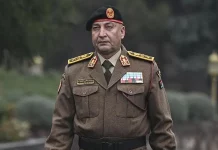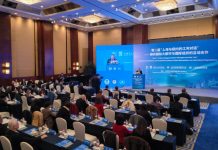-PM reiterates commitment to ensure transparency in use of EVMs in electoral process
-Says overseas Pakistanis are an asset of the country
-Stresses expats’ involvement in the election process
-Briefed on EVMs progress
-Directs strategy formulation for clean water supply
-President calls for addressing ECP’s reservations on electoral laws amendment
By Uzma Zafar
ISLAMABAD: Prime Minister Imran Khan has said that electronic voting was the only way to ensure transparency and prevent rigging in the elections, a statement from the PM Office said Thursday.
The premier’s comments came during a meeting in Islamabad, where he was briefed on the use of electronic voting machines in the electoral process.
Minister for Science and Technology Shibli Faraz, Leader of the House in the Senate Senator Dr Shehzad Wasim, Minister for Railways Azam Khan Swati, Minister of State for Information and Broadcasting Farrukh Habib, and Advisor to the Prime Minister Babar Awan were present during the briefing.
The prime minister was given a detailed briefing on the progress made so far in the use of the electronic voting machine and legislation in this regard. PM Imran Khan reiterated his commitment to ensure transparency in the use of electronic voting machines in the electoral process and fulfill all constitutional requirements. The premier said that the incumbent government was committed to ensuring transparency in the electoral process of the country. “Overseas Pakistanis are an asset of the country, they must be involved in the election process electoral reforms, electronic voting, and voting process for overseas Pakistanis should be completed soon,” he instructed the concerned officials.
On June 10, the House had passed the Elections (Second Amendment) Bill which pertains to fair, free and transparent election through the utilisation of technology and modern gadgets. The bill is also aimed at granting voting rights to the Overseas Pakistanis which may only be possible by vesting exclusive authority in ECP with the technical assistance of NADRA and other agencies.
Amendments were sought in section 94 and 103 of the Election Act, 2017 to achieve the aforesaid objectives. Government, Opposition at loggerheadsThe Opposition parties have rejected the government’s electoral reforms, with PML-N leader Ahsan Iqbal, last week, saying the government had passed two laws in the National Assembly that paved the way for it to “rig” the next elections.
Last month, the Pakistan Democratic Movement (PDM) had also rejected the government’s “one-sided” electoral reforms, which include the use of electronic voting machines (EVMs), and announced a fresh wave of anti-government protests.
“PDM rejects the government’s unilateral electoral reforms ordinance, including the voting machines, and terms it as pre-poll rigging,” PDM chief Maulana Fazlur Rehman had said, as he addressed a press conference alongside PDM leaders.
In this regard, the Election Commission of Pakistan, which is responsible for holding transparent elections, should call a meeting of all political parties to take a unanimous decision on reforms, he had said. Information Minister Chaudhry, speaking on the floor of the National Assembly on June 7, had said the Opposition had refused to talk to the government over electoral reforms.
“When we speak to them about electoral reforms, they ask us to first [amend] National Accountability Bureau (NAB) laws,” he had said. Meanwhile, Mr. Khan has directed the authorities concerned to devise a comprehensive strategy on wastewater treatment to ensure supply of clean water to urban population and for agricultural purposes.
Chairing a meeting on the progress on Ravi Urban City and Central Business District projects, the prime minister stressed the need for installation of wastewater treatment plants especially in major cities. The prime minister said in cities like Lahore, the use of modern technology was important to meet the shortage of water for growing population.
The meeting was attended by Finance Minister Shaukat Tareen, Special Assistant Dr Shahbaz Gill, Chairman Naya Pakistan Housing Authority Lt Gen (retd) Anwar Ali Haider, CEO Ravi Urban Development Authority Imran Amin, Vice Chairman Lahore Development Authority S.M. Imran Amin and senior officials. The prime minister was informed that the development work at Sapphire Bay would be initiated soon after the finalization of the contract next week. The process regarding approval of industrial zone will be completed by June to be followed by construction of the infrastructure. The educational institutions including Iqra University, University of Management and Technology and ISC will set up their campuses in Ravi City. Also, Iqra University has shown interest in building a hospital besides its campus.
The meeting was also briefed on the transfer of three water plants by Water and Sanitation Authority (WASA) plants to Ravi City and the use of modern technology for wastewater treatment. The participants were also updated on the directions issued by Environmental Protection Agency by Judicial Water Commission to expedite the approval process of Ravi Urban City project. It was highlighted that a quota for local populace had been reserved for jobs under the Ravi City project and around 100,000 households would benefit from the opportunity. Also, the locals will get medical treatment on fifty percent concession.
On Central Business District project, it was informed that the auction process would start in the first week of July 2021. A board has already been established for the Central Business District project which was in consultation with Nespak and Frontier Works Organization (FWO) to finalize a design, with the development work set to begin next week.
Besides, President Dr Arif Alvi Thursday directed the authorities concerned to address the reservations shown by the Election Commission of Pakistan (ECP) regarding the amendments in the electoral laws. Chairing a meeting of the sub-committee on Emerging Technologies in i-voting, the president reiterated that the final decision about implementation of the electoral processes would be taken by the ECP.
The meeting was attended by Minister for Information Technology and Telecommunication Syed Amin-ul-Haq, Minister for Railways, Azam Khan Swati, Secretary IT&T, Dr Muhammad Sohail Rajput, Acting Chairman NADRA, Brig (R) Khalif Latif, DG (IT) ECP, Khizer Aziz, and other government officials.
The president said the government organizations would facilitate the ECP in executing the reform process in a transparent manner. He emphasised that the right to vote was the fundamental right of every citizen of the country which they could not be deprived of due to the weaknesses in our system.
President Alvi underlined the need for improving the existing electoral laws to enable about nine million overseas Pakistanis to exercise their right to vote in line with the directions of the Supreme Court of Pakistan. He stressed the need for improving communication among the stakeholders to address any misconceptions about i-voting for overseas Pakistanis. Referring to the Elections Act, 2017, Azam Khan Swati informed the meeting that 49 amendments were incorporated in the said Act with the consent of ECP and this time the relevant organizations should also support the ongoing reforms to ensure transparency and credibility of the electoral process.




